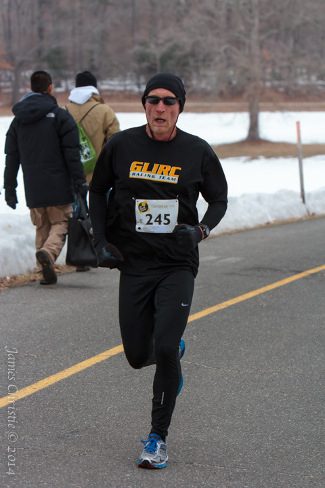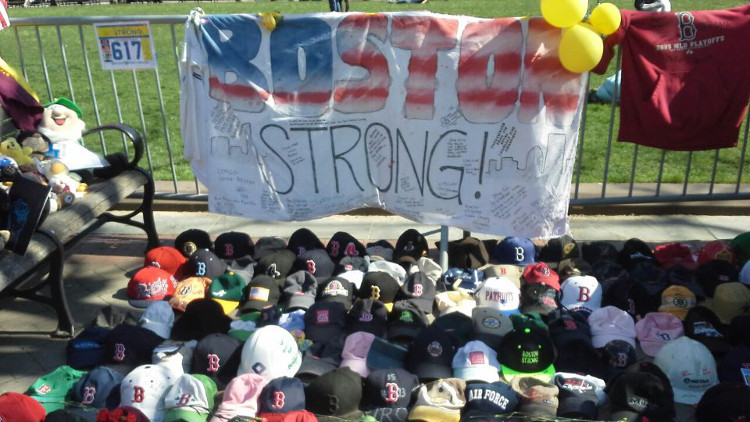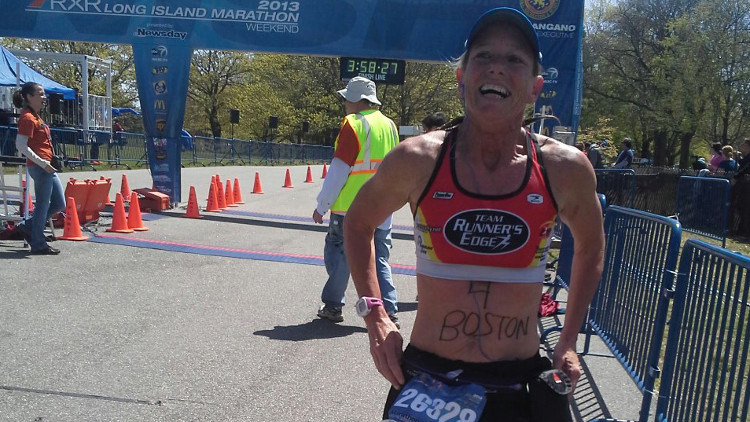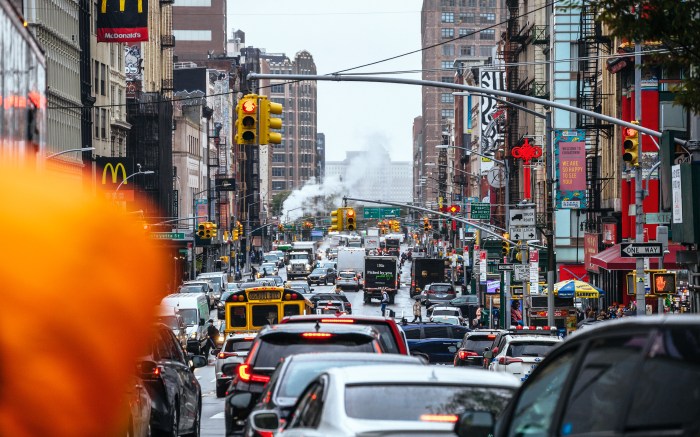A couple of days before last year’s Boston Marathon, Barbara Stagnari came down with an ailment that zapped her strength.
The 52-year-old veteran marathoner from Mineola was unable to regain the energy lost from a darned bug that arrived at the most inopportune time, but she ran the marathon anyway.
Unfortunately, the sickness was too much to overcome. Stagnari was lagging, and eventually found herself well behind her personal best of 3:38 when she decided to slow down and take in the atmosphere. Less than five minutes from the the Boylston Street finish line, she began snapping photos of the crowd, capturing the breathtaking view of the city, the giddy—and drunken—revelers, the joy of Patriot’s Day.
Then, the ground shook. Strange, she thought.
With her view of the finish line obstructed, Stagnari was unable to see the thin white smoke billowing over the race’s endpoint.
“You heard this loud boom and you automatically think it’s thunder,” she tells the Press, one year later.
Then, a second intense sound pierced the tense air.
Neither she, nor many of her fellow runners, knew what had just transpired. Moments later, authorities barricaded the course, cutting off the route to the 26.2-mile Boston Marathon finish line about a block away. Stagnari and dozens of others waited in the cold, confused. Cramps began to set in.
At that point, she recalls, “You knew something was up.”
Her husband and daughter, standing together on the corner of Boylston Street near a firehouse, sent separate text messages notifying her that they were unharmed. Although she was only about a block away from her loved ones, Stagnari couldn’t reach them by foot. Attempts to reach them via text were also unsuccessful.
She eventually ended up at a Sheraton hotel, where the staff warmed her with towels and offered her tea. A lobby TV blaring breaking news revealed multiple explosions. It was the first successful terrorist attack on U.S. soil since Sept. 11, 2001. She later rejoined her family.
On Monday, Stagnari will return to the Boston Marathon, almost exactly one year to the day when two pressure cooker bombs killed three and injured 260 others—mutilating several spectators, ripping limbs from bodies. Many have yet to fully recover from their gruesome injuries—many others never will.
One of the alleged attackers, Dzhokhar Tsarnaev, is awaiting his trial, which is slated to start Nov. 3. The government is pursuing the death penalty. His older brother and alleged accomplice, Tamerlan Tsarnev, was killed in a shootout with police several days after the April 15, 2013 bombings.
But before the younger Tsarnaev brother gets his day in the court, Boston gets the opportunity to reflect, celebrate and cheer—perhaps with more enthusiasm than ever before. And at least 40 Long Islanders will be right there by their side, running.

“We’re Going to Keep Running”
This will be Michael Fernandez’s first Boston Marathon.
On Dec. 31, 2013, the 45-year-old Farmingdale-native started a 16-week training program that incorporated speed workouts and longer runs to build endurance—all of which occurred outside during this year’s brutal winter. “Nothing on a treadmill,” he boasts. At his peak, he ran 73 miles in one week.
He ran along the North Shore to prepare for the infamous downhills along the famed course, often beginning his training sessions at Syosset High School. Other days he would run along River Road in Smithtown. He sometimes sought areas with more spectacular views: Prospect Park in Brooklyn and Manhattan’s Central Park. In the weeks leading up to the race he continued running all but one day a week, but has tapered off since then so he could rest his legs and focus on nutrition and getting a good night’s sleep. He never diverted from the program.
“Boston is going to be historic for me this year,” Fernandez says. “To me, Boston, if you’re a runner, that’s the spot. That’s the holy grail. That’s like the Super Bowl.”
Fernandez has been driven by competition all his life. He played football and baseball as a kid and is a self-proclaimed “gym rat.” But he only started running five years ago. This will be his third marathon.
While he oozes with enthusiasm discussing his inaugural Boston Marathon, Fernandez gets equally amped while reflecting on his unlikely journey to Beantown—a journey born from the desire to pay tribute to the great city, those affected that tragic day one year ago, as well as the country he loves so dearly.
“Never in a million years did I think I’d be at the starting line of the Boston Marathon,” he admits. “If you asked me four years ago I would’ve had said, ‘Never.’ Now here I am.”
He won’t be alone.
Kathy Dormer would love to eclipse her previous marathon best of 3:34. But then again, this will be her first-ever Boston Marathon so “I’m just happy to be there,” she says.
The 44-year-old Williston Park mom works part-time at the Greater Long Island Running Club, a fitness organization which has approximately 4,500 members. She races home after her morning shift, changes into comfortable running gear and sneaks in a run before it’s time to pick up her kids from school.
The weekends are less frenzied. That’s when she gets to enjoy longer runs at a more relaxed pace. It’s cathartic.
“My weekdays are kind of hectic,” she says.

This will also be Dormer’s third marathon, but promises to be the most poignant.
“Boston Marathon has so much history and I think all runners really would love to be a part of that, especially this year with all that happened and the tragedy that took place at the finish line,” Dormer says. “I think it means even more just to be a part of it and support those who can’t run, and just celebrate running.”
“Marathons could be really emotional anyway, you know, because you put so much time and effort into it, you work so hard and you want to do well,” she adds. “When you hear people cheering it does get very emotional no matter what the race is.”
Stagnari, the Mineola woman returning to the marathon after last year’s tragedy, will be competing in her 30th marathon. Yet, her athletic prowess extends far beyond the asphalt.
She’s also competed in 13 Iron Man competitions, an exhausting tour-de-force that includes a 2.4-mile swim, 112-mile bike trek and a marathon for good measure. She typically partakes in about three marathons each year. Her best mark was five, if you count the Iron Man triathlon.
A natural swimmer, Stagnari transitioned to running after she had four kids in a five-year span.
“There was no way I was getting to the pool,” she says.
But swimming remains part of her training regimen. On certain days she will both swim and run. On Tuesdays she does a track workout with a local triathlon group, she bikes on Thursdays and runs on weekends.
While initially lamenting coming down with an ailment just before last year’s race, Stagnari now considers herself fortunate.
“Luckily I decided to take my time once I wasn’t having a great race,” she says.
“I missed the bomb and all that probably by three or four minutes,” she adds. “So I was lucky that I stopped and took pictures.”
Stagnari never hesitated when it was time to decide if she’d return to Boston this year despite heightened security because of last year’s attack.
“You really want to do it now,” Stagnari says.
Fernandez, one of the first-time runners, echoes that sentiment.
“This year makes it even greater, because it’s bigger than all of us this year,” he says with pride. “For me, going back to Boston it’s about showing up in the face of adversity and here we are, we’re still here, we’re going to keep running. When those bombs went off last year I would’ve run the next day if they let me. I would’ve gone to Boston and run the next day. The worst thing that people can do in this scenario is not run a race because you’re afraid, that is the worst thing, that sends the wrong signals.”
“I’m going to be thinking about those people as I come down Boylston Street,” adds Fernandez.
Along with the rest of America, most of whom will be watching from their couches.

























